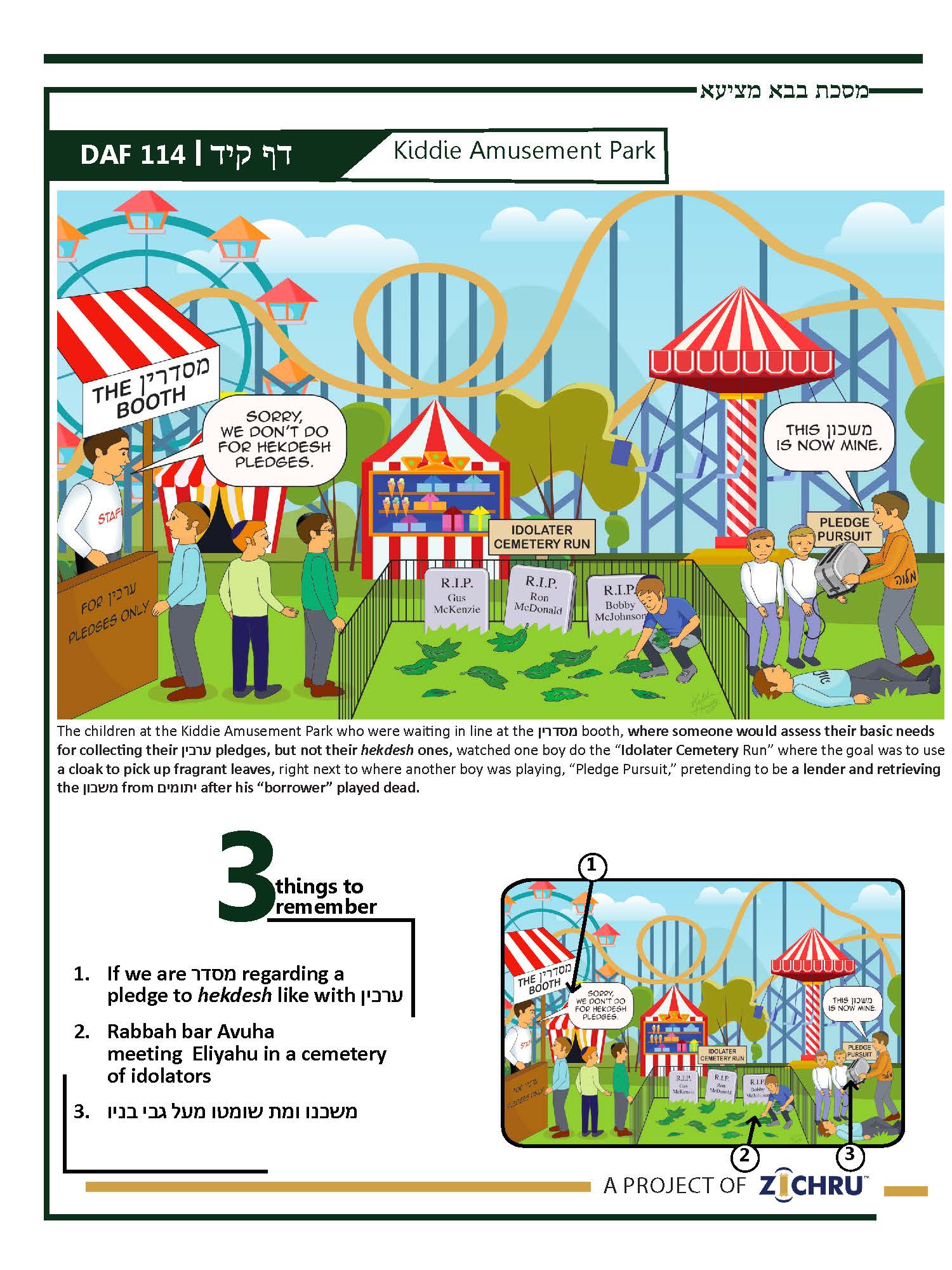Bava Metzia - Daf 114
- Audio Timestamps
0:00 - The 3 Sugyos
2:43 - Review of 3 Sugyos
5:12- Siman
7:27 - 4 Blatt Back Chazarah
14:15 - Pop Quiz (Last 7 blatt)
- For access to all Zichru resources including PDFs, and illustrations CLICK HERE
- Taking a משכון from a wealthy widow, machlokes to be דריש טעמא דקרא
The next Mishnah states: אלמנה בין שהיא ענייה בין שהיא עשירה – A widow, whether she is poor or wealthy, אין ממשכנין אותה – we do not take a משכון from her, because the Torah says: ולא תחבל בגד אלמנה – you shall not take as security the garment of a widow. In a Baraisa, this ruling is quoted from Rebbe Yehudah, but Rebbe Shimon argues and says one may take a משכון from a wealthy widow. The Torah only prohibited taking a משכון from a poor widow, because he must return it daily, ואתה משיאה שם רע בשכנותיה – and you would thereby give her a bad name among her neighbors who would suspect her of improper conduct. The Gemara explains that Rebbe Shimon is דריש טעמא דקרא – expounds the reason of the passuk to limit its applications, and so limits the above prohibition to its reason, and Rebbe Yehudah does not. The Gemara asks that they seem to reverse their positions in a machlokes about a king’s prohibition to marry too many wives, where Rebbe Yehudah holds he may, ובלבד שלא יהו מסירות את לבו – provided that they do not turn his heart away from Hashem, and Rebbe Shimon holds he may not marry too many wives, even if they are like Avigayil. The Gemara answers that in this case, where the Torah itself writes the reason, each Tanna reverses his opinion, as it proceeds to explain.
- The number of prohibitions for taking a mill as a משכון
The next Mishnah states that one who takes a portable mill as a משכון transgresses a לאו, and is liable for two utensils, because the Torah writes them separately: לא יחבל ריחים ורכב – he shall not take a lower millstone or upper millstone for security. One is also liable for taking כל דבר שעושין בו אוכל נפש – anything used for food preparation, because the passuk says: כי נפש הוא חבל – for he is taking a life as a security. Rav Huna says that one who takes either an upper millstone or lower millstone incurs two sets of malkus, one for the individual utensil, and another for the general prohibition of "כי נפש הוא חובל". If he took both millstones, he incurs three sets of malkus. Rav Yehudah disagrees and says that millstones are only liable for their explicit prohibition, but "כי נפש הוא חובל" is לשאר דברים הוא דאתא – coming only to prohibit taking other articles used in food preparation, not millstones.
- Malkus for "כי אם צלי אש" regarding korban pesach
The Gemara suggests comparing the above machlokes with another: Rava says that if one ate a korban pesach נא – partially unroasted, he incurs two sets of malkus, one for the specific "נא" of the passuk, and another for the general prohibition of "כי אם צלי אש" – unless it is roasted over a fire. If he ate it cooked, he incurs malkus for "מבושל" – cooked, as well as for "כי אם צלי אש". If he ate it both partially roasted and cooked, he is liable for all three prohibitions. Abaye says: אין לוקין על לאו שבכללות – one does not incur malkus for a general prohibition. The Gemara suggests that Abaye holds like Rav Yehudah, who said one is not liable for the general prohibition of "כי נפש הוא חובל" for taking a millstone, and Rava holds like Rav Huna, who says he is. The Gemara proceeds to explain how this machlokes may be specific to the prohibition of "כי נפש הוא חובל".
Siman – Ketores Maker
The lender who took the wealthy woman’s ketores maker as a משכון, wisely left behind her portable mill which would have made him chayav for two sets of malkus, after recalling how he was lashed twice the previous Pesach for eating the korban Pesach partially raw.


